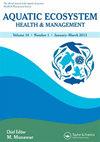过去和未来的淡水供应情况及其对印度孙德尔本斯生态系统和渔业的影响
IF 0.8
4区 环境科学与生态学
Q4 ENVIRONMENTAL SCIENCES
引用次数: 0
摘要
印度孙德尔本斯被认为是世界上最易受气候变化影响的地区之一。生活在印度孙德尔本斯的约 443 万人面临淡水供应不足的问题,原因是季风雨变化无常、气旋风暴频繁、盐水入侵以及其他因素,所有这些都影响了该地区的渔业和农业活动。本研究介绍了通过过去和预测的未来降雨量和蒸散量变化情景对孙德尔本斯淡水可用性的估算。由于缺乏高质量的现场数据,因此使用了各种来源的网格降雨量和蒸散量数据。1948 年至 2010 年间,19 个行政区中有一半的季风降雨量呈下降趋势,其余的呈上升趋势。在季风季节,孙德尔本斯不同区块的淡水供应量呈下降趋势,这对渔业和农业活动来说是一个非常令人担忧的问题。利用耦合模型相互比较项目第五阶段的粗分辨率全球气候模型,针对像孙德尔本斯这样的较小区域,使用统计降尺度生成未来降雨量和蒸散量情景。缩小尺度的全球气候模型预测,在 RCP 4.5 和 RCP 8.5 排放情景下,未来季风降雨量都将呈上升趋势。然而,降雨量增加可能会扩大洪泛平原面积,扩大鱼类的觅食地。可能需要适当的适应技术来利用积极影响,同时防止消极影响。本文章由计算机程序翻译,如有差异,请以英文原文为准。
Past and future freshwater availability scenarios and their impact on the Indian Sundarbans ecosystem and fisheries
The Indian Sundarbans is considered one of the zones of highest vulnerability in the world in terms of climate change. About 4.43 million people living in the Indian Sundarbans face a lack of freshwater availability due to the erratic behaviour of monsoon rains, frequent cyclonic storms, intrusion of saline water, and other factors, all of which affect the fisheries and agriculture activities of this area. In this study, estimates of freshwater availability through past and predicted future rainfall and evapotranspiration change scenarios in the Sundarbans are presented. Due to the lack of high-quality in-situ data, various sources of gridded rainfall and evapotranspiration data were used. Between 1948 and 2010, half of the 19 administrative blocks showed a decreasing trend of monsoonal rainfall while the rest showed an increasing trend. Freshwater availability showed a decreasing trend during the monsoon season over different blocks of the Sundarbans, which is a matter of great concern for fisheries and agricultural activities. Statistical downscaling was used to generate future rainfall and evapotranspiration scenarios, using coarse resolution Global Climate Models from the Coupled Model Intercomparison Project phase five for a smaller area like the Sundarbans. Downscaled Global Climate Models project an increasing trend in future monsoon rainfall in both RCP 4.5 and RCP 8.5 emission scenarios. The increasing rainfall can trigger excessive run-off and flooding, which would in turn affect aquaculture infrastructure and damage lentic aquaculture productions across the Sundarbans. however, increased rainfall may expand the flood plain area and extend the feeding grounds of fish. hence, the impact of rainfall change is quite unpredictable. Proper adaptation techniques may be required to harness the positive impacts while preventing negative effects.
求助全文
通过发布文献求助,成功后即可免费获取论文全文。
去求助
来源期刊

Aquatic Ecosystem Health & Management
环境科学-海洋与淡水生物学
CiteScore
1.70
自引率
0.00%
发文量
1
审稿时长
18-36 weeks
期刊介绍:
The journal publishes articles on the following themes and topics:
• Original articles focusing on ecosystem-based sciences, ecosystem health and management of marine and aquatic ecosystems
• Reviews, invited perspectives and keynote contributions from conferences
• Special issues on important emerging topics, themes, and ecosystems (climate change, invasive species, HABs, risk assessment, models)
 求助内容:
求助内容: 应助结果提醒方式:
应助结果提醒方式:


